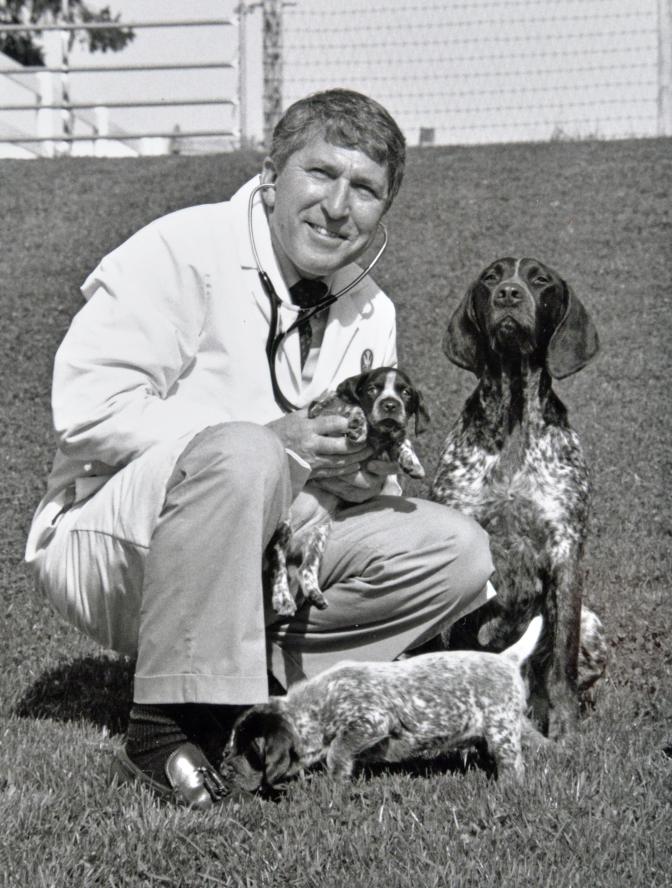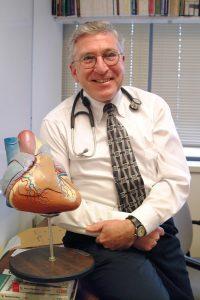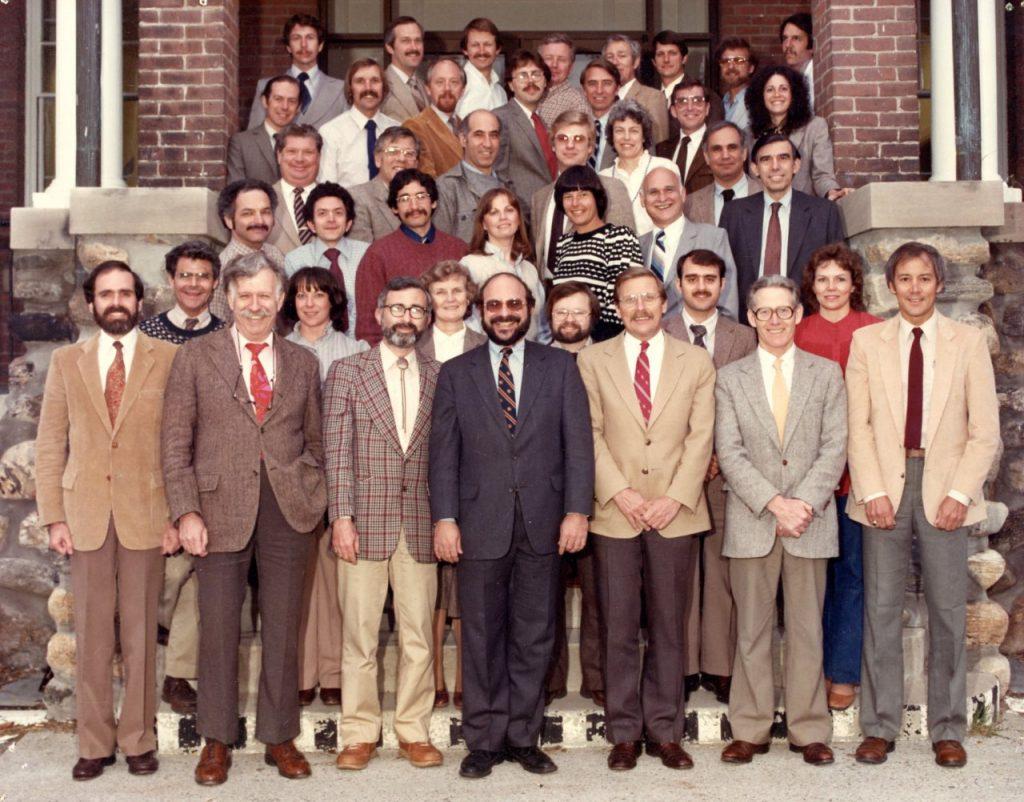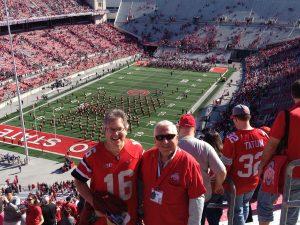-
About
- Leadership & Faculty
- News & Events
-
Academics
- Graduate
- Advanced Clinical Training
- Continuing Education
- Academic Departments
- Academic Offices
- Simulation Experiences
-
Student Life
- Offices
-
Research
-
Hospitals & Clinics
- Emergency Care
- Hospital Services
-
Community Outreach
- Volunteer
Remembering Jim Ross
For 24 years at Tufts, this founding father of the small-animal medical curriculum fought for the best training possible on behalf of both his students and patients

On Feb. 25, Cummings School of Veterinary Medicine received the sad news of the passing of Distinguished Professor Emeritus James Ross.
A lifelong and passionate advocate for veterinary education and training, Ross was a founding member of what was then called Tufts School of Veterinary Medicine. He served as chair of the school’s original Department of Medicine and was a founding member of both the American College of Veterinary Emergency Critical Care and the cardiology specialty group within American College of Veterinary Internal Medicine. He also was as a past president of the Massachusetts Veterinary Medical Association.
Cummings School faculty, staff, and alumni who knew Jim well describe him as passionate, energetic, and committed. He was instrumental in shaping the character and future of Cummings School. He will long be remembered for not only what he accomplished, but who he was. Below are just a few of the fond recollections shared by his former colleagues.
A Founding Father
“Jim was a founding father of the school in the truest sense. He and I overlapped in administrative positions for a year, when I first became a department chair and Jim was the Foster Hospital for Small Animals director. Jim could not have been more supportive —he taught me not to sweat the small stuff, what work to prioritize, and how to advocate successfully. Jim’s points of view were always crystal clear—no one doubted his position on any issue—and this quality was a source of stability and a significant factor in the early success of the school. He was a superb cardiologist and small-animal clinician who took genuine joy from everything he and others accomplished. More than anything, he truly cared for the school and everyone connected to it. Jim will long be remembered in the lore of the school, and he will be greatly missed.”
—Professor John Berg
A Mentor—and a Night Owl
“Jim was an amazing mentor. He could always come up with ideas for projects, funding opportunities etc. His enthusiasm was contagious, although occasionally it was hard to keep up with his ideas.
I remember that Jim and I were hired at about the same time. I was still on the staff at Angell when Jim came to Boston. I was working an evening shift when I got a call from him wanting to know if I could meet him that evening downtown to discuss tentative plans for the new Clinical Sciences Department. I said that I was looking forward to meeting him, but we should plan another time since I would not be finished until around 10 pm. His answer was: ‘That’s perfect. Come when you finish.’ I did and we talked almost until midnight. That was the first hint that Jim was a ‘night person.’ I am much more of a morning person.
We worked well together planning how clinic rotations would work in the small-animal Hospital, which would be at Angell before the Grafton hospital was built. We also designed the Small-Animal Medicine Course for third-year students. We just made it up. The curriculum committee did not exist. He included me in early decisions about who we might want to join the small-animal group. It was always fun and exciting working with Jim. He was always ready to fight for what he thought he needed. The ‘fights’ usually were with Roger Spidell, who also turned out to be Jim’s friend.
Another adventure with Jim was our feral cat spay/neuter project in Virgin Gorda, British Virgin Islands. Jim had met a New York cat lover with a home there and a British mystery writer, also a cat lover. Jim convinced them to sponsor and mostly fund a project where a team of two faculty and a few students from Tufts could go there to trap, neuter, and release cats. Jim and I were the first faculty members to be able to participate. We were guests at a very nice hotel, where cats were a nuisance begging for food at their outdoor restaurant and raided their trash. Jim would often go to the local bars after dinner to meet people and learn where to find other places where people fed cats. We would set traps at night and collect cats early the next morning. The students would do the surgeries, and we would release the cats at the end of the day. Since Jim was the night person, he had the idea that we should also check traps late at night so we could reset the traps and thus catch more cats. After a few days, everyone except Jim seemed sleep-deprived, so he and I made a deal. We would assign one student to late night with Jim, and the rest of us would get up early to start the surgeries. That worked well, and this project continued for several years.
Jim loved fierce, but friendly political discussions. He, as a conservative and also pro-gun person, was a little out of place in New England. My husband, a liberal, used to love to set Jim off. The two of them were good friends, but you would never know it when you would hear them argue. Jim’s favorite hobby was fishing. He would often invite students to go fishing with him on his boat. I think year-round fishing was a large part of his move to Florida after retirement.
Overall, it was wonderful working with Jim. I am sure that I accomplished much more during my time at Tufts than I ever would have without him.”
— Distinguished Professor Emerita Susan Cotter
An Influential Teacher
“What can you say about Jim Ross? He was one of a kind.
Early on during my time at Tufts I was very excited about getting my first stethoscope, but I couldn’t manage to hear anything with it. I mentioned to Jim that I thought it might be because I’m deaf in my right ear. He took my stethoscope spun the head around and said, ‘Try it now.’ Of course, I could then hear the heartbeat using the diaphragm. And he did it without making me feel like an idiot.
He was one of my favorite professors—brilliant, funny, always helpful and encouraging, with a lovable crazy side. I did a one-on-one elective with him my junior year. It was one of my best experiences in vet school. I was blown away with how good he was. The first day we started the morning with a stack of ECG consults. He picked up a strip and scrolled through it for literally less than 2 seconds and told me the rate, rhythm, and MEA. I said, ‘Come on, you couldn’t possibly do it that fast!’ He opened a drawer to his desk, handed me his calipers, and said check it out. I spent the next 10 minutes struggling to calculate the MEA, and of course he was dead on. I do the same thing now to my interns and residents and thank Jim in my head each time while laughing to myself.
After vet school, there were lot of get togethers at ACVIM and IVECCS meeting, dinners, drinks, fishing, and hanging at jazz clubs. Always a great time.
Over the years, I have given many cardiology lectures, trained many interns and residents, and I can’t count how many times I’ve used Jim’s ‘it depends’ line. And it is so true. There is another thing that is so true… if it wasn’t for Jim Ross, I wouldn’t be a cardiologist today. Thank you, Jim! You will be missed.”
— George A. Kramer, V86
An Incredible Legacy
“Jim was hired in the earliest days of Tufts Veterinary School’s development to be the original and only chairman of our school’s Department of Medicine, contributing significantly to the veterinary school’s original curriculum design and (with Dept. of Surgery chair, Dr. Tony Schwartz) the 1985 transition of our early clinical education program from Angell Memorial Hospital to the new Foster Hospital for Small Animals on Tufts’ Grafton campus. Dr. Ross took great pride in his mentoring and helping develop the academic careers of his young faculty members.
He was energetic, and often ferocious, in his advocacy for his faculty and his beliefs in how veterinary medicine should be taught. He found joy in debating and arguing his positions. Jim was honored by Tufts University and named as a ‘Distinguished Professor.’
With Drs. Murtaugh and Rush, Jim Ross was one of the founding members of the American College of Veterinary Emergency and Critical Care (for board-certified ECC specialists).
Dr. Ross was double boarded in the American College of Veterinary Internal Medicine (cardiology) and the ACVECC.
Jim and John Rush were the school faculty team that first acquired the VETS clinic, now Tufts Veterinary Emergency Treatment and Specialties, a community-based veterinary specialty teaching hospital in Walpole, Massachusetts.
Jim’s closest Tufts friend, and fishing buddy, at the (then) ‘Tufts School of Veterinary Medicine’ was our former Associate Dean for Administration and Finance, Roger Spidle, who predeceased Jim by only a few months.
Though quite short in stature, Jim was proud of his collegiate wrestling career at ‘The’ Ohio State University from where he also earned his D.V.M. degree.”
— Executive Associate Dean Joseph P. McManus
A Career Builder
“Jim Ross was a unique and memorable character, as many can attest, but I remember him as the person responsible for initiating my academic career. I was a young, newly accredited small-animal internal medicine specialist when he hired me as one of the first faculty members at the newly started Tufts Veterinary School. I remember spending many hours with Jim and the few other small-animal medicine faculty as we developed the clinical curriculum from scratch. It was an adventure, to say the least.
Jim had a very strong personality and never hesitated to make his views known. However, he had another side—he was a superb teacher. He was very good at simplifying and explaining concepts so that students understood. He told me on more than one occasion that teaching was the best part of his job. Much of his legacy is in the veterinarians that he helped train.
I must also note that as the other Dr. Ross (Linda Ross), new acquaintances usually assumed that we were related. We were not—we were just two people with the same name in the same department. Because Jim and I were polar opposites in personality and beliefs—Jim an arch conservative and I a liberal feminist—I spent a lot of time explaining our “non-relationship” to others. Jim was well aware of this, and it became a long-standing joke between the two of us.” — Associate Professor Emeritus Linda Ross
A Champion of Others
“Jim was always so thrilled with the success of others, especially those who he had supported over the years. I will miss engaging discussions, late-night adventures, excellent support for my clinical adventures, and fishing with Jim. He will be greatly missed.”
— Professor John Rush
A Ferocious Fighter
“Jim Ross was cutting-edge in his clinical knowledge and expertise, and he demanded the same of everyone else. He was a friend and a partner in the enterprise of establishing the clinical programs and facilities of the school during the earliest days, when we were not certain the school would survive. We were among others on the faculty who did not worry that the school might not make it. We just plowed ahead and did what we thought was right to create the finest environment for our students and faculty.
Jim was one of a kind. Intelligent, driven by the desire for the excellence of everything in which he was involved, extraordinarily enthusiastic about the school, very supportive of his faculty, and willing to fight with anyone who had a slightly different opinion—his wrestling experience clearly impacted how he interacted. His way of attempting to prevail was to try to intimidate you into surrender by moving his face to within an inch of yours, stating his position strongly and loudly. One had to learn how to deal with this onslaught.
We often would find ourselves in a meeting where issues would be discussed, about which we just did not agree. These were never issues that, if they had gone one way or the other, would have caused harm to the school—just issues of ‘how to get there.’ The faculties of our departments would witness these discussions (‘The Jim and Tony Show’). They would watch us like a tennis match, often with smiles on their faces. They knew that we loved each other, and we were both out for the best. I have missed this interaction greatly. I miss seeing and hearing him. His passing is a great loss, personally and to the school.”
— Professor Emeritus Anthony Schwartz


